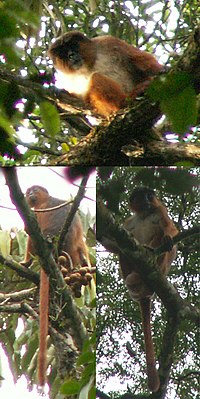
Photo from wikipedia
Abstract It is commonly assumed that larger species are more vulnerable to extinction because of their low population densities and slow time to recover from setbacks. We report that, contrary… Click to show full abstract
Abstract It is commonly assumed that larger species are more vulnerable to extinction because of their low population densities and slow time to recover from setbacks. We report that, contrary to this expectation, it is the smaller ungulate species that first reached the brink of local extirpation within a 950 km 2 fenced protected area, the Hluhluwe-iMfolozi Park. Moreover, earlier records show that most of these species had formerly been extremely common within the park region. Neither habitat change, competition for resources or exposure to predation provided a consistent sole explanation for the drastic population crashes shown by five smaller ungulate species (body mass 10–45 kg). We suggest that smaller species can be more vulnerable to local extinction as a consequence of their narrower habitat occupation and hence restricted spatial distribution. Nevertheless all of the threatened species thrive widely outside the protected area. Our findings show that smaller rather than larger species can be most at risk of local extirpation when confined within protected areas. Hence more attention needs to be given to conserving such species within broader regional landscapes.
Journal Title: Biological Conservation
Year Published: 2017
Link to full text (if available)
Share on Social Media: Sign Up to like & get
recommendations!